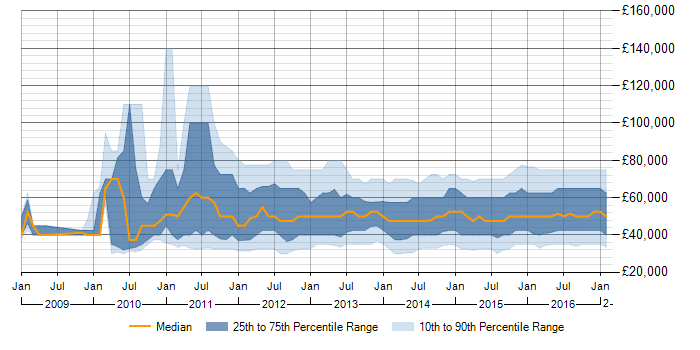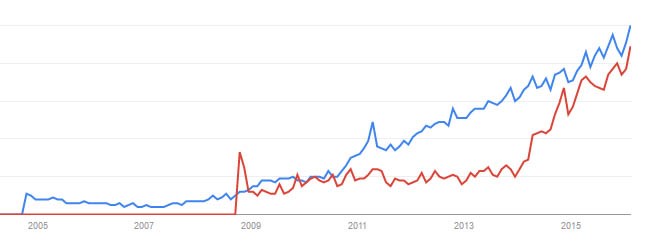Amazon AWS vs Microsoft Azure Certification
With the recent survey conducted by Microsoft in November, more than 1,100 partners and clients tracked compensation in Azure cloud with enterprise architects and developers remaining the most sought-after role. This was illustrated in a report by Redmond Channel Partner. Not many would argue that cloud certifications are on the rise, but there's an increasing number of job opportunities for those with skills in cloud architecture and infrastructure.
It’s been 11 years since the introduction of Amazon Web Services (AWS) and in that time a lot has changed with AWS and the competitive landscape. One of those competitors, Microsoft Azure, has been operating since 2010. Not quite as long as AWS but Microsoft has a history of making significant improvement to its products. Since Amazon and Azure are the two primary players, which is the right one for you?
Amazon AWS
The AWS platform now comprises a number of exceptional suites and tools with the most popular being Amazon Elastic Compute Cloud EC2 hosting, S3 Content Delivery and Dynamo DB. It's possible to develop, build and scale powerful applications entirely in AWS using a range of mature frameworks and software development kits.
The Amazon AWS certification lends itself nicely to a wide range of tech professionals simply because it welcomes a range of languages and platforms such as .NET, PHP, Java and both Linux and Windows operating systems.
Closely followed by Microsoft's Azure certification, the AWS Certification is a relatively new addition to the certification world; in fact it's only been going since 2013. AWS now has five certifications to choose from. The most popular of these is the Solutions Architect path followed by the Dev, SysOps and DevOps certs - which could explain the ordering on the AWS website. Let's take a look at the trends for AWS...
Percentage of Jobs Over Time (Source: IT Jobs Watch)

The number of cloud roles doubled between 2014 to 2016 with Amazon AWS now consuming over 3% of all the tech jobs. Within the cloud category, Amazon AWS makes up more than 30% of the total roles and is equaling the number of roles that mention Microsoft Azure.
Salary Over Time (Source: IT Jobs Watch)

Despite a huge spike, the average salary for Amazon AWS roles has remained fairly consistent at $100K, rising around 5% year on year. It hasn't exploded but considering the huge increase in the number of roles available, banking a new role using AWS is more achievable than ever before.
Microsoft Azure
Microsoft's Azure cloud platform is relatively new compared to Amazon AWS but it's certainly still as popular, and with their massive foothold in enterprise companies worldwide, Microsoft has a big advantage.
Azure integrates with almost every Microsoft product you can think of and the cloud is now considered the mainstream roadmap for all Microsoft technologies. Indeed the new Windows 10 certifications include large chunks of cloud content for Intune and Office 365.
Developers will also know only too well the benefits of hosting solutions in the cloud for immediate access to scalable resources. Visual Studio integrates natively with Azure for pushing builds to test deployments and live servers with minimum effort.
The only real disadvantage for Azure is that it's really tailored to Microsoft technologies. It does offer support for Open Source choices but this is not to the same degree as AWS.
Microsoft offers three certifications for Azure, one for Visual Studio web developers, one for architects and another for Linux. Let's take a look at the trends for Azure...
Percentage of Jobs Over Time (Source: IT Jobs Watch)

As you can see from the graph above, the % share of "cloud services" jobs mentioning Azure has sharply increased in the last 2 to 3 years, this follows a similar trend to AWS. However, the actual number of jobs mentioning Azure has quadrupled in the last two years! That's double the growth rate of AWS therefore you could argue that Azure will overtake AWS in the near future.
Salaries Over Time (Source: IT Jobs Watch)

The salary figures for Azure closely match those for AWS. A similar peak is clearly evident in 2010 signifying the start of the Azure demand. At that time few professionals possessed the necessary Azure skills (a skills drought) and thus companies were forced to offer exceptionally high salaries to grab talent.
Over the last few years the salary average for Azure has closely followed the $100K scale shown by AWS.
Interest over time (Source: IT Jobs Watch)

Azure (Red), AWS (Blue)
Most of the job market trends are usually mirrored by online trends and this remains true for AWS. For many years Amazon AWS had dominated the cloud market, even going back as far as 2006. This lasted until around 2010 when Microsoft launched Windows Azure.
In the last couple of years Microsoft has played an immediate game of catch up, as you can see from the red line on the graph above. The reason for this is the shift from client to cloud for almost all of Microsoft's enterprise products and their drive for more cloud certifications.
For some unknown reason Amazon took many years to release their AWS certifications and it wasn't until 2014 that the first architect exam appeared. Demand for AWS skills has since increased with many employers now asking for an AWS Certification for some of the highest paying jobs on the job boards.
If you are looking to move into a high paying architect role then both AWS and Azure offer some of the best salaries in the tech industry. Both certifications will easily offer you a 100K salary and the demand for both skills is high.
AWS and Azure offer very similar services with neither one being truly better than the other. Both support Content Delivery Networks’ Virtual Machines, Databases, Auto Scaling, Load Balancing and many other common cloud functions.
If you asked me which certification I would go for, I would probably lean towards Azure. If you're a Visual Studio developer then integrating with Azure instances and the bonus of Azure SQL makes Azure an obvious choice. Conversely, PHP and Java developers will probably want to opt for AWS instead to utilize the better support for Linux builds.

Natalie Evans
Natalie Evans has over 16-years in the tech industry and currently works as the event coordinator and tech reporter for CMS-Connected, keeping up-to-date on what's happening in and around the Content Management industry.